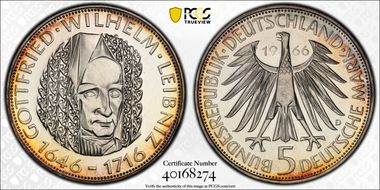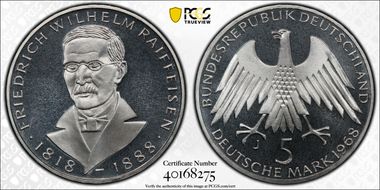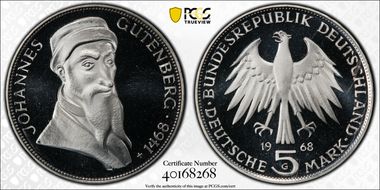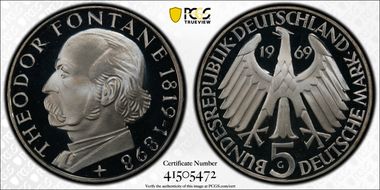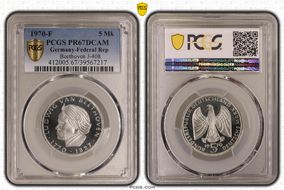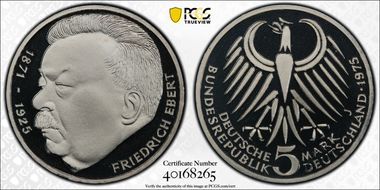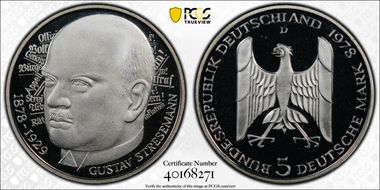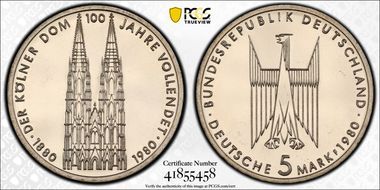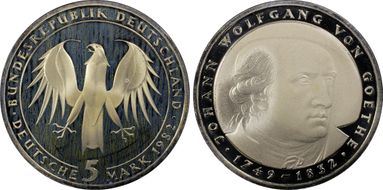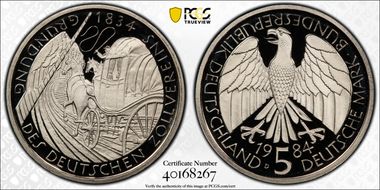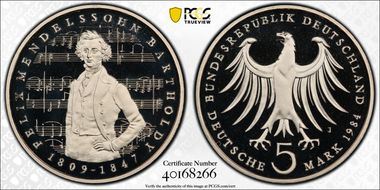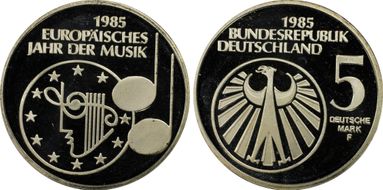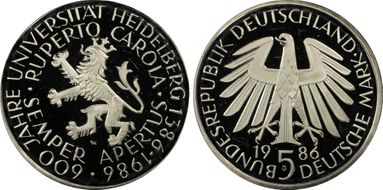Koenigsberg Collection | W. Germany 5 Mark PR | Commemoratives 的钱币相册
Germany-Federal Republic | KM# 117 | J-391 | Commemorating the 100th obit of the poet Joseph Freiherr von Eichendorff Joseph Freiherr von Eichendorff (10 March 1788 – 26 November 1857) was a Prussian poet, novelist, playwright, literary critic, translator, and anthologist. Eichendorff was one of the major writers and critics of Romanticism. Ever since their publication and up to the present day, some of his works have been very popular in Germany.
Germany-Federal Republic | KM# 119.1 | J-394 | Commemorating the 250th obit of Gottfried Wilhelm Leibniz Gottfried Wilhelm (von) Leibniz, 1 July 1646 [O.S. 21 June] – 14 November 1716) was a prominent German polymath and one of the most important logicians, mathematicians and natural philosophers of the Enlightenment. As a representative of the seventeenth-century tradition of rationalism, Leibniz developed, as his most prominent accomplishment, the ideas of differential and integral calculus, independently of Isaac Newton's contemporaneous developments. Mathematical works have consistently favored Leibniz's notation as the conventional expression of calculus.[citation needed] It was only in the 20th century that Leibniz's law of continuity and transcendental law of homogeneity found mathematical implementation (by means of non-standard analysis). He became one of the most prolific inventors in the field of mechanical calculators. While working on adding automatic multiplication and division to Pascal's calculator, he was the first to describe a pinwheel calculator in 1685 and invented the Leibniz wheel, used in the arithmometer, the first mass-produced mechanical calculator. He also refined the binary number system, which is the foundation of nearly all digital (electronic, solid-state, discrete logic) computers, including the Von Neumann machine, which is the standard design paradigm, or "computer architecture", followed from the second half of the 20th century, and into the 21st. In philosophy, Leibniz is most noted for his optimism, i.e. his conclusion that our universe is, in a restricted sense, the best possible one that God could have created, an idea that was often lampooned by others such as Voltaire. Leibniz, along with René Descartes and Baruch Spinoza, was one of the three great 17th-century advocates of rationalism. The work of Leibniz anticipated modern logic and analytic philosophy, but his philosophy also assimilates elements of the scholastic tradition, notably that conclusions are produced by applying reason to first principles or prior definitions rather than to empirical evidence. Leibniz made major contributions to physics and technology, and anticipated notions that surfaced much later in philosophy, probability theory, biology, medicine, geology, psychology, linguistics, and computer science. He wrote works on philosophy, politics, law, ethics, theology, history, and philology. Leibniz also contributed to the field of library science. While serving as overseer of the Wolfenbüttel library in Germany, he devised a cataloging system that would serve as a guide for many of Europe's largest libraries. Leibniz's contributions to this vast array of subjects were scattered in various learned journals, in tens of thousands of letters, and in unpublished manuscripts. He wrote in several languages, primarily in Latin, French and German but also in English
Germany-Federal Republic | KM# 120.1 | J-395 | Commemorating the 200th birthday of Wilhelm von Humboldt, in memory of his brother Alexander von Humboldt Friedrich Wilhelm Heinrich Alexander von Humboldt (14 September 1769 – 6 May 1859) was a Prussian polymath, geographer, naturalist, explorer, and proponent of Romantic philosophy and science. He was the younger brother of the Prussian minister, philosopher, and linguist Wilhelm von Humboldt (1767–1835) Humboldt's quantitative work on botanical geography laid the foundation for the field of biogeography. Humboldt's advocacy of long-term systematic geophysical measurement laid the foundation for modern geomagnetic and meteorological monitoring.
Germany-Federal Republic | KM# 121 | J-396 | Commemorating the 150th birthday of Friedrich Wilhelm Raiffeisen Friedrich Wilhelm Raiffeisen (30 March 1818 – 11 March 1888) was a German mayor and cooperative pioneer. Several credit union systems and cooperative banks have been named after Raiffeisen, who pioneered rural credit unions.
Germany-Federal Republic | KM# 122 | J-397 | Commemorating the 500th obit of Johannes Gutenberg Johannes Gensfleisch zur Laden zum Gutenberg (/ˈɡuːtənbɜːrɡ/) was a German goldsmith, inventor, printer, and publisher who introduced printing to Europe with his mechanical movable-type printing press. His work started the Printing Revolution and is regarded as a milestone of the second millennium, ushering in the modern period of human history. It played a key role in the development of the Renaissance, Reformation, Age of Enlightenment, and Scientific Revolution, as well as laying the material basis for the modern knowledge-based economy and the spread of learning to the masses.
Germany-Federal Republic | KM# 127 | J-408 | Commemorating the 200th birthday of Ludwig van Beethoven Ludwig van Beethoven (/ˈlʊdvɪɡ væn ˈbeɪtoʊvən/ (listen); German: [ˈluːtvɪç fan ˈbeːtˌhoːfn̩] (listen); baptised 17 December 1770 – 26 March 1827) was a German composer and pianist. Beethoven remains one of the most admired composers in the history of Western music; his works rank amongst the most performed of the classical music repertoire. His works span the transition from the classical period to the romantic era in classical music. His career has conventionally been divided into early, middle, and late periods. The "early" period, during which he forged his craft, is typically considered to have lasted until 1802. From 1802 to around 1812, his "middle" period showed an individual development from the "classical" styles of Joseph Haydn and Wolfgang Amadeus Mozart, and is sometimes characterized as "heroic". During this time he began to suffer increasingly from deafness. In his "late" period from 1812 to his death in 1827, he extended his innovations in musical form and expression.
Germany-Federal Republic | KM# 127 | J-408 | Commemorating the 200th birthday of Ludwig van Beethoven Ludwig van Beethoven (/ˈlʊdvɪɡ væn ˈbeɪtoʊvən/ (listen); German: [ˈluːtvɪç fan ˈbeːtˌhoːfn̩] (listen); baptised 17 December 1770 – 26 March 1827) was a German composer and pianist. Beethoven remains one of the most admired composers in the history of Western music; his works rank amongst the most performed of the classical music repertoire. His works span the transition from the classical period to the romantic era in classical music. His career has conventionally been divided into early, middle, and late periods. The "early" period, during which he forged his craft, is typically considered to have lasted until 1802. From 1802 to around 1812, his "middle" period showed an individual development from the "classical" styles of Joseph Haydn and Wolfgang Amadeus Mozart, and is sometimes characterized as "heroic". During this time he began to suffer increasingly from deafness. In his "late" period from 1812 to his death in 1827, he extended his innovations in musical form and expression.
Germany-Federal Republic | KM# 137 | J-412 | Commemorating the 125th anniversary of the gathering of the Frankfurt Parliament on 5/18/1848 The Frankfurt Parliament (German: Frankfurter Nationalversammlung, literally Frankfurt National Assembly) was the first freely elected parliament for all of Germany, elected on 1 May 1848. The session was held from 18 May 1848 to 31 May 1849, in the Paulskirche at Frankfurt am Main. Its existence was both part of and the result of the "March Revolution" within the states of the German Confederation.
Germany-Federal Republic | KM# 141 | J-416 | Commemorating the 50th obit of Friedrich Ebert Friedrich Ebert; 4 February 1871 – 28 February 1925) was a German politician of the Social Democratic Party of Germany (SPD) and the first President of Germany from 1919 until his death in office in 1925.
Germany-Federal Republic | KM# 147 | J-422 | Commemorating the 100th birthday of Gustav Stresemann Gustav Ernst Stresemann; (10 May 1878 – 3 October 1929) was a German statesman who served as chancellor in 1923 (for 102 days) and as foreign minister from 1923 to 1929, during the Weimar Republic. His most notable achievement was the reconciliation between Germany and France, for which he and French Prime Minister Aristide Briand received the Nobel Peace Prize in 1926. During a period of political instability and fragile, short-lived governments, he was generally seen as the most influential cabinet member in most of the Weimar Republic's existence. During his political career, he represented three successive liberal parties; he was the dominant figure of the German People's Party during the Weimar Republic.
Germany-Federal Republic | KM# 160 | J-435 | Commemorating the 150th anniversary of the Zollverein The Zollverein (pronounced [ˈtsɔlfɛɐ̯ˌʔaɪn]), or German Customs Union, was a coalition of German states formed to manage tariffs and economic policies within their territories. Organized by the 1833 Zollverein treaties, it formally started on 1 January 1834. However, its foundations had been in development from 1818 with the creation of a variety of custom unions among the German states. By 1866, the Zollverein included most of the German states. The foundation of the Zollverein was the first instance in history in which independent states consummated a full economic union without the simultaneous creation of a political federation or union. Prussia was the primary driver behind the creation of the customs union. Austria was excluded from the Zollverein because of its highly protected industry and also because Prince von Metternich was against the idea. By the founding of the North German Confederation in 1867, the Zollverein covered states of approximately 425,000 square kilometres, and had produced economic agreements with several non-German states, including Sweden-Norway. After the founding of the German Empire in 1871, the Empire assumed the control of the customs union. However, not all states within the Empire were part of the Zollverein until 1888 (Hamburg for example). Conversely, though Luxembourg was a state independent of the German Reich, it remained in the Zollverein until 1919.
Germany-Federal Republic | KM# 161 | J-436 | Commemorating the 175th birthday of Felix Mendelssohn Bartholdy Jakob Ludwig Felix Mendelssohn Bartholdy (3 February 1809 – 4 November 1847), born and widely known as Felix Mendelssohn, was a German composer, pianist, organist and conductor of the early Romantic period. Mendelssohn's compositions include symphonies, concertos, piano music, organ music and chamber music. His best-known works include the overture and incidental music for A Midsummer Night's Dream, the Italian Symphony, the Scottish Symphony, the oratorio St. Paul, the oratorio Elijah, the overture The Hebrides, the mature Violin Concerto and the String Octet. The melody for the Christmas carol "Hark! The Herald Angels Sing" is also his. Mendelssohn's Songs Without Words are his most famous solo piano compositions.























